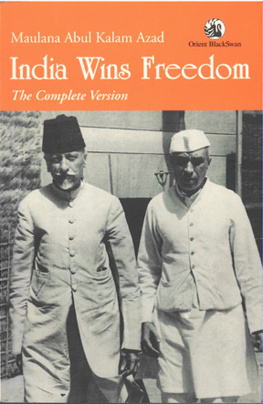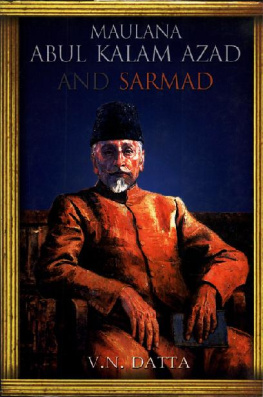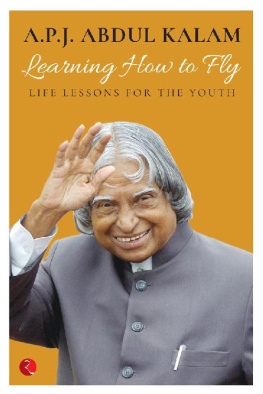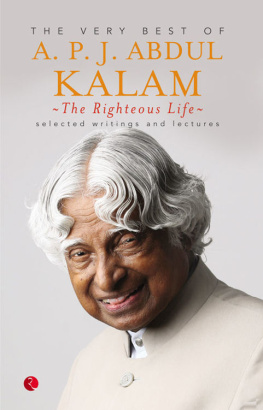Maulana Abul Kalam Azad - Words of freedom: ideas of a nation
Here you can read online Maulana Abul Kalam Azad - Words of freedom: ideas of a nation full text of the book (entire story) in english for free. Download pdf and epub, get meaning, cover and reviews about this ebook. City: India;New Delhi, year: 2010, publisher: Penguin Books Ltd, genre: Religion. Description of the work, (preface) as well as reviews are available. Best literature library LitArk.com created for fans of good reading and offers a wide selection of genres:
Romance novel
Science fiction
Adventure
Detective
Science
History
Home and family
Prose
Art
Politics
Computer
Non-fiction
Religion
Business
Children
Humor
Choose a favorite category and find really read worthwhile books. Enjoy immersion in the world of imagination, feel the emotions of the characters or learn something new for yourself, make an fascinating discovery.

- Book:Words of freedom: ideas of a nation
- Author:
- Publisher:Penguin Books Ltd
- Genre:
- Year:2010
- City:India;New Delhi
- Rating:4 / 5
- Favourites:Add to favourites
- Your mark:
- 80
- 1
- 2
- 3
- 4
- 5
Words of freedom: ideas of a nation: summary, description and annotation
We offer to read an annotation, description, summary or preface (depends on what the author of the book "Words of freedom: ideas of a nation" wrote himself). If you haven't found the necessary information about the book — write in the comments, we will try to find it.
Words of freedom: ideas of a nation — read online for free the complete book (whole text) full work
Below is the text of the book, divided by pages. System saving the place of the last page read, allows you to conveniently read the book "Words of freedom: ideas of a nation" online for free, without having to search again every time where you left off. Put a bookmark, and you can go to the page where you finished reading at any time.
Font size:
Interval:
Bookmark:
The basis of belief should be information and free thinking; why should it stand on imitation and inherited tradition MAULANA ABUL KALAM AZAD
M aulana Abul Kalam Azad, one of the greatest stalwarts of Indias freedom struggle, possessed a fiercely independent and inquiring mind. His search for truth and his commitment to the ideas of freedom led him to take the pen name Azad. He studied pan-Islamic ideas in the Middle East and, back in India, joined Aurobindo Ghoshs armed struggle and was jailed by the British for his revolutionary activities. He joined the Indian National Congress in 1920 becoming one of the Congresss most prominent leaders. Maulana Azad was bitterly opposed to Partition, convinced that only a united India would protect the interests of all communities. After Independence, he became Indias first education minister, a post he held till his death.
His speeches and writings are illuminated by his cerebral yet down-to-earth style. Whether he is exploring the limitations of an orthodox Islamic education, reflecting on the place of personal sorrow in the duties of a political life or analysing the cruel consequences of the division of the country, his wordsinspiring, passionate and relentlessly honestring true even today.
Maulana Abul Kalam Azad joined the Indian National Congress in 1920, becoming one of its most prominent leaders. After Independence, he was education minister in Jawaharlal Nehrus cabinet until his death in 1958.
Cover illustration by Nitesh Mohanty
To celebrate the sixtieth anniversary of the Indian Republic, the Words of Freedom series showcases the landmark speeches and writings of fourteen visionary leaders whose thought animated the Indian struggle for Independence and whose revolutionary ideas and actions forged the Republic of India as we know it today.
Books in the series
B. R. Ambedkar
Aruna Asaf Ali
Maulana Abul Kalam Azad
Subhas Chandra Bose
Mohandas Karamchand Gandhi
Khan Abdul Ghaffar Khan
Sarojini Naidu
Jawaharlal Nehru
Vallabhbhai Patel
Rajendra Prasad
C. Rajagopalachari
Periyar E.V. Ramasami
Bhagat Singh
Rabindranath Tagore
OF
FREEDOM

PENGUIN BOOKS
Published by the Penguin Group
Penguin Books India Pvt. Ltd, 11 Community Centre, Panchsheel Park, New Delhi 110 017, India
Penguin Group (USA) Inc., 375 Hudson Street, New York, New York 10014, USA
Penguin Group (Canada), 90 Eglinton Avenue East, Suite 700, Toronto, Ontario M4P 2Y3, Canada (a division of Pearson Penguin Canada Inc.)
Penguin Books Ltd, 80 Strand, London WC2R 0RL, England
Penguin Ireland, 25 St Stephens Green, Dublin 2, Ireland (a division of Penguin Books Ltd)
Penguin Group (Australia), 250 Camberwell Road, Camberwell, Victoria 3124, Australia (a division of Pearson Australia Group Pty Ltd)
Penguin Group (NZ), 67 Apollo Drive, Rosedale, North Shore 0632, New Zealand (a division of Pearson New Zealand Ltd)
Penguin Group (South Africa) (Pty) Ltd, 24 Sturdee Avenue, Rosebank, Johannesburg 2196, South Africa
Penguin Books Ltd, Registered Offices: 80 Strand, London WC2R 0RL, England
Published by Penguin Books India 2010
Anthology copyright Penguin Books India 2010
Acknowledgements and Sources is an extension of the copyright page.
All rights reserved
While every effort has been made to trace copyright holders and obtain permission, this has not been possible in all cases; any omissions brought to our attention will be remedied in future editions.
ISBN: 978-01-4306-889-1
This digital edition published in 2011.
e-ISBN : 978-81-8475-195-6
This e-book is sold subject to the condition that it shall not, by way of trade or otherwise, be lent, resold, hired out, or otherwise circulated without the publishers prior written consent in any form of binding or cover other than that in which it is published and without a similar condition including this condition being imposed on the subsequent purchaser and without limiting the rights under copyright reserved above, no part of this publication may be reproduced, stored in or introduced into a retrieval system, or transmitted in any form or by any means (electronic, mechanical, photocopying, recording or otherwise), without the prior written permission of both the copyright owner and the above-mentioned publisher of this e-book.

Maulana Abul Kalam Azad, one of the tallest stalwarts of Indias freedom struggle, was born in 1888. He received an orthodox Islamic education but his independent, questing mind led him to an interest in pan-Islamic thought and he travelled widely in the Middle East. On his return, he joined Aurobindo Ghoshs revolutionary movement and extended the armed struggle to northern India and Bombay. His revolutionary views led the British to intern him. He subsequently joined the Indian National Congress in 1920 and was active in the Quit India movement, becoming one of the Congresss most prominent leaders. He was bitterly opposed to Partition, convinced that a united India would serve the interests of all communities best. After Independence, he was education minister in Jawaharlal Nehrus cabinet until his death in 1958. His passionate espousal of liberty led him to take the pen name Azad because he valued freedom of action and thought above everything else.
AHMEDNAGAR FORT, 11 AUGUST 1942
 NORMALLY PEOPLE RECEIVE RELIGION AS FAMILY HERITAGE. So did I. But I could not remain satisfied with inherited faith. My thirst was more intense than to be quenched by that alone; I had to abandon the old path in search of new avenues. New anxieties and new quests appeared even before I had crossed fifteen years of age; my mind began to show dissatisfaction with the shapes and forms in which the inherited beliefs appeared. First I encountered the internal sectarian differences within Islam and the mind reeled under the contradictory claims and mutually conflicting edicts. A little further appeared the worldwide contentions of religion as such. That converted surprise and wonder into doubt that grew into denial. That was followed by the mutual conflict of religion and intellect so that whatever faith was there was lost. The fundamental questions about life that we do not normally remember appeared one by one and covered the entire mental horizon. What is truth? Where is truth? Does it really exist or not? And if it is there and is one (for there cannot be more than one truth) why are paths to it different? Not only different but contradictory and conflictual? And surprise of surprises, in the face of all contradictions and conflicts the intellect stands carrying the light of inflexible verdicts and solid facts. In this light, all the mysteries of orthodox traditions that mankind has been treating as lofty and sacred, are disappearing one after another.
NORMALLY PEOPLE RECEIVE RELIGION AS FAMILY HERITAGE. So did I. But I could not remain satisfied with inherited faith. My thirst was more intense than to be quenched by that alone; I had to abandon the old path in search of new avenues. New anxieties and new quests appeared even before I had crossed fifteen years of age; my mind began to show dissatisfaction with the shapes and forms in which the inherited beliefs appeared. First I encountered the internal sectarian differences within Islam and the mind reeled under the contradictory claims and mutually conflicting edicts. A little further appeared the worldwide contentions of religion as such. That converted surprise and wonder into doubt that grew into denial. That was followed by the mutual conflict of religion and intellect so that whatever faith was there was lost. The fundamental questions about life that we do not normally remember appeared one by one and covered the entire mental horizon. What is truth? Where is truth? Does it really exist or not? And if it is there and is one (for there cannot be more than one truth) why are paths to it different? Not only different but contradictory and conflictual? And surprise of surprises, in the face of all contradictions and conflicts the intellect stands carrying the light of inflexible verdicts and solid facts. In this light, all the mysteries of orthodox traditions that mankind has been treating as lofty and sacred, are disappearing one after another.
This path always starts from doubt and ends at denial and if you cant proceed further you are bound to face despair.
Thak thak ke har muqam pe do chaar reh gaye
Tera pata na payen to nachaar kya karen!
(At every stage some people stop, exhausted;
Font size:
Interval:
Bookmark:
Similar books «Words of freedom: ideas of a nation»
Look at similar books to Words of freedom: ideas of a nation. We have selected literature similar in name and meaning in the hope of providing readers with more options to find new, interesting, not yet read works.
Discussion, reviews of the book Words of freedom: ideas of a nation and just readers' own opinions. Leave your comments, write what you think about the work, its meaning or the main characters. Specify what exactly you liked and what you didn't like, and why you think so.




